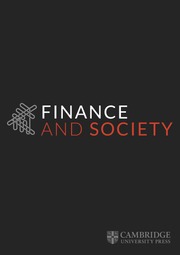No CrossRef data available.
Article contents
Varieties of volatility
Published online by Cambridge University Press: 09 November 2023
Abstract
Core share and HTML view are not available for this content. However, as you have access to this content, a full PDF is available via the ‘Save PDF’ action button.
This article explores the quantitative and qualitative dimensions of volatility and their implications for cultural analysis in a range of fields. From quantitative finance, it takes the notion of ‘delta-hedging’, the suspension or neutralization of directionality to get access to volatility, and applies this to qualitative areas such as surfing, dance, cinema, and language.
Information
- Type
- Article
- Information
- Finance and Society , Volume 9 , Issue 3: Volatility in finance, art, and culture , 2023 , pp. 37 - 57
- Creative Commons
- This is an Open Access article, distributed under the terms of the Creative Commons Attribution-NonCommercial-No Derivatives licence (http://creativecommons.org/licenses/by-nc-nd/4.0/), which permits noncommercial re-use, distribution, and reproduction in any medium, provided the original work is unaltered and is properly cited. The written permission of Cambridge University Press must be obtained for commercial re-use or in order to create a derivative work.
- Copyright
- © 2023 The Author(s)
References
Traveler, Aloha (2008) Laird Hamilton takes on Teahupoo (video). YouTube. Available at: <https://youtu.be/pYQQtxb8wv0>. Accessed 11 April 2023..+Accessed+11+April+2023.>Google Scholar
Ayache, E. (2015) The Medium of Contingency: An Inverse View of the Market. New York: Palgrave Macmillan.Google Scholar
Belinski, I. (2018) Slavoj Zizek & Philippe Petit: Act of courage (video). YouTube. Available at: <https://www.youtube.com/watch?v=TnTc1fLFee0&ab_channel=IppolitBelinski>. Accessed 11 April 2023..+Accessed+11+April+2023.>Google Scholar
Black, F. (1989) How we came up with the option formula. Journal of Portfolio Management, 15(2): 4–8.Google Scholar
Csikszentmihalyi, M. (1996) Creativity: Flow and the Psychology of Discovery and Invention. New York: Harper Perennial.Google Scholar
De Man, P. (1979) Allegories of Reading: Figural Language in Rousseau, Nietzsche, Rilke, and Proust. New Haven, CT: Yale University Press.Google Scholar
Derman, E. (2002) The perception of time, risk and return during periods of speculation. Quantitative Finance, 2(4): 282–96.Google Scholar
Derman, E. (2016) My Life as a Quant: Reflections on Physics and Finance. New York: John Wiley & Sons.Google Scholar
Derman, E. (2023) A stylized history of volatility. SSRN papers. Available at: <http://dx.doi.org/10.2139/ssrn.4297590/>..>Google Scholar
Deleuze, G. (2003) Francis Bacon: The Logic of Sensation. Minneapolis: University of Minnesota Press.Google Scholar
Deleuze, G. and Guattari, F. (1988) A Thousand Plateaus: Capitalism and Schizophrenia. London: Athlone.Google Scholar
Gustin, M. (1996) The connection of Merce Cunningham and John Cage Chance. Austin Chronicle, 26 January. Available at: <https://www.austinchronicle.com/arts/1996-01-26/530489/>. Accessed 11 April 2023..+Accessed+11+April+2023.>Google Scholar
Jakobson, R. (1987) Linguistics and poetics. In: Pomoska, K. and Rudy, S. (eds.) Language in Literature. Cambridge, MA: Harvard University Press, 62–94.Google Scholar
Jakobson, R. (1990) Two aspects of language and two types of aphasic disturbances. In: Waugh, L. and Monville-Burston, M. (eds.) On Language. Cambridge, MA: Harvard University Press, 115–33.Google Scholar
Keynes, J.M. (1936) The General Theory of Employment, Interest and Money. London: Macmillan & Co.Google Scholar
Martin, R. (2010) Toward a decentered social kinesthetic. Dance Research Journal, 42(1): 77–80.Google Scholar
Martin, R. (2015) Knowledge LTD: Toward a Social Logic of the Derivative. Philadelphia, PA: Temple University Press.Google Scholar
Sapir, E. (1921) Language: An Introduction to the Study of Speech. New York: Harcourt, Brace & World.Google Scholar
Whitney Museum of American Art (2010) Elizabeth Streb discusses Trisha Brown's Man Walking Down the Side of a Building (video). YouTube. Available at: <https://www.youtube.com/watch?v=9kxWm31jh3Q&ab_channel=WhitneyMuseumofAmericanArt>. Accessed 11 April 2023.. Accessed 11 April 2023.' href=https://scholar.google.com/scholar?q=Whitney+Museum+of+American+Art+(2010)+Elizabeth+Streb+discusses+Trisha+Brown's+Man+Walking+Down+the+Side+of+a+Building+(video).+YouTube.+Available+at:+.+Accessed+11+April+2023.>Google Scholar
Wilmott, P. (2009) Frequently Asked Questions in Finance. Chichester: John Wiley & Sons.Google Scholar
Zaloom, C. (2006) Out of the Pits Traders and Technology from Chicago to London. Chicago, IL: University of Chicago Press.Google Scholar

